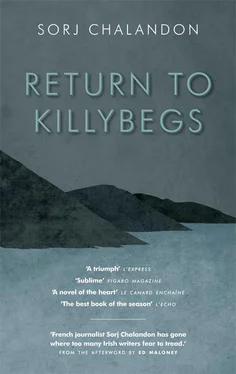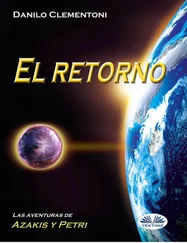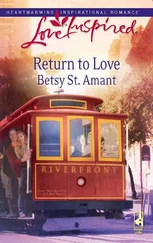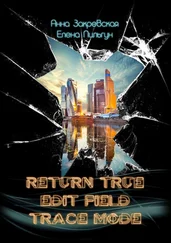At dawn, my mother wrapped herself in her shawl to protect baby Sara asleep in her belly. She searched the deserted village for her husband. I went to the pub. The barman was rolling beer barrels along the pavement with his hands. My father had left the pub towards one in the morning, one of the last. Just before closing, he had wandered between the tables, trying to catch someone’s eye. Nobody would look at him. The owner showed him the door with a tilt of his chin. When he went out, he turned left, headed towards the port. He bumped against the walls of his village as he walked. Two witnesses saw him bend down close to the quarry and pick up something from the roadside. It was very cold. They found him on the village outskirts in the early hours, on a road leading to the sea. He was grey, lying on the frozen ground, ice for blood. His left arm was raised, fist clenched as if he’d been fighting with an angel. Before moving him, the gardaí thought his death an accident. Drunk, fallen over, unable to get up again, sleeping it off till morning arrived.
It was only when they turned the body over that they understood. My father had died on his way to death. He had filled his pockets with rocks. They filled his trousers, his cardigan, his jacket, his blue woollen overcoat. He’d even slipped stones into his cap. These were the shards of rock he was gathering the night before in the quarry. He was walking towards his end when his heart had stopped. He wanted to die like the ordinary men of Donegal, to walk into the sea until the water took him. He was leaving, stuffed with his earth, without a word, without a tear. Just the wind, the waves and the light of the dead. Padraig Meehan wanted this legendary end. My father left the world a poor wreck, his face pressed against the frost, and his rocks, for nothing.
When my father died, people turned away. Misery was contagious. It was bad luck to watch us walk by. We were no longer a family but a pale, straggly herd. My brothers, sisters and I made a pitiful troupe, led by a she-wolf on the brink of madness. We’d walk in single file, each of us holding on to the next by the end of a coat. For three months we lived on charity. In exchange for cabbages and potatoes, we helped out at the presbytery. Róisín and Mary used to scrub the floors of the corridors on their knees. Seánie, wee Kevin and myself used to wash windows by the dozen. Áine, Brian and Niall would help in the refectory and my mother would sit on a bench in the corridor, baby Sara nestled against her, hidden between shawl and breast. I wasn’t miserable, or even sad, or envious of anything. We lived off the little we got. In the evenings, my brothers and I used to fight the gang led by Timmy Gormley, the self-titled ‘king of the quays’. A dozen young lads, broken like us, pieced together. They were nasty, hot-tempered, and about as tough as toy soldiers, shocked when their noses would bleed. They called us ‘the Meehan gang’. Father Donoghue used to break us apart with a hazel rod. He had no time for our laughter and was even less tolerant of our after-dark shenanigans.

In the winter of 1940, I went to work on the bog with Seánie. Every day for two months. We used to help cut the turf with a spade and load the mules in spring and at Halloween, but this was the first time we had worked in the cold. The farmer needed extra hands for bringing in the harvest. The mud no longer sucked our shoes off but the cold water and ice turned them into cardboard. There were about twenty of us young lads in the ditches. The farmer called us his ‘hired hands’. It was nicer than calling us his orphans. We were frozen and shaking, our sods heaped up in our arms, heavy as a dead friend. In return for the work, the boss would give us some turf, bacon and milk. No money. He said that money was for men and we had no need to be drinking or smoking.
Joseph ‘Josh’ Byrne was the bravest of us all and the youngest, barely six years old. For nine hours a day, he carefully piled up his frozen sods and then ballasted the tarpaulin that protected them. And he sang, too. He gave us a little bit of heaven. With his singing we became sailors, our hands working with his voice, cutting the earth as we would have hoisted the sail. He sang in step with arms crossed, under the rain, in the wind, in Irish, in English. He sang while tapping the ground with his foot. He hadn’t yet learned how to read or write, so his words would stray at times. He’d invent rhymes and words and make us laugh.
His father had run off and his mother was dead. Josh had been raised by his sisters, the only boy amongst muddy skirts and greasy aprons. He wanted to be a soldier, or a priest, something that would be useful to men. He was frail and needed glasses: he’d be a priest.
When he wasn’t singing, he was praying for us. Out loud, at the edge of the ditch, as though standing beside a grave. In the morning, before taking up the shovels, we would listen to him on our knees. In the evening, when the Angelus rang at St Bridget’s, he used to say the Hail Mary, his eyes wide with shock if our lips remained closed. Father Donoghue was fond of him. He called him ‘the angel’. Josh was his altar boy and despite his age, unsightly face, lumpy chalk-coloured skin, horse hair, crossed eyes and enormous ears, he was respected. The women used to say that a spirit had taken over his body. Mother saw him as a leprechaun or an elf, a pixie from our forests. One day, Tim Gormley swore God had afflicted him so he’d be made a saint.
— What a pity! I hope not, Josh had quietly replied.
And Gormley was left with his nasty remark, not knowing quite what to do with it, surrounded by his hyenas of brothers.
We left Ireland because of the Gormleys. Their cruelty was the final straw for our family. One evening in February Timmy and Brian cornered wee Kevin on his way home. My brother was carrying milk from the farmer to the house. He swung his milk can about him, spitting at the same time. Wee Kevin had always done that. When he was frightened or angry, or when his silence was disturbed, he’d bristle like a cat. With his red hair in his eyes, his lip curled, his black teeth, he would slaver down his chin and spit. This time the Gormleys didn’t back off. Timmy whacked my brother’s legs with a hurley. Brian smacked his ear with a closed fist. Wee Kevin dented the aluminium milk can against the low wall as he spat on the shadows.
My brother was limping and in tears when he got home. He was gripping the handle of the can, which had fallen to the pavement. Nobody told him off. My mother looked out the window. She was afraid the gang might have followed him. Seánie and I tore out the door, the taste of blood and milk in our mouths. Wee Kevin was drenched in urine. Those dogs had pissed all over him. We scoured the village, roaring out Timmy Gormley’s cursed name. Seánie smashed a rock through the window of the grocery where his mother worked. We killed no one. We gave up. We went home.
My mother was waiting for us at the door, her shawl over her head. Her brother, Lawrence Finnegan, had made her an offer she’d accepted. We could no longer continue to live in Killybegs, between the humiliation, the damp and the fighting. She was leaving, we were following. We were going to leave our Ireland, the land of my father. We were going elsewhere, to the other side, we were going to cross the border towards war.
— As long as I’m alive, my children will never see a British flag, my father used to say when he was drunk.
He was dead. His word had died with him.
Mother had decided to sell my father’s house. For weeks the blue and yellow sign remained stuck in the gravel of our path. But that dreary pile of stones was of no interest to anyone. Too cramped, too far from everything. And then death was prowling around there, misery, the grief of that widow with her rosary beads who spoke to Jesus as though giving her husband a piece of her mind.
Читать дальше













